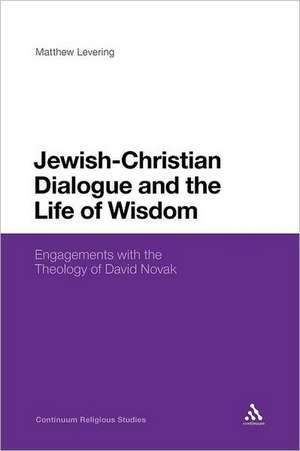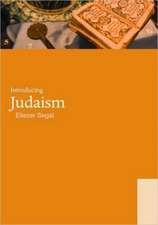Jewish-Christian Dialogue and the Life of Wisdom: Engagements with the Theology of David Novak
Autor Professor Matthew Leveringen Limba Engleză Paperback – 26 oct 2011
This book inquires as to whether theological dialogue between Christians and Jews is possible, not only in itself but also as regards the emergence of communities of Messianic Judaism. In light of David Novak's insights, Matthew Levering proposes that Christian theological responses to supersessionism need to preserve both the Church's development of doctrine and Rabbinic Judaism's ability to define its own boundaries.
The book undertakes constructive philosophical theology in dialogue with Novak. Exploring the interrelated doctrines of divine providence/theonomy, the image of God, and natural law, Levering places Novak's work in conversation especially with Thomas Aquinas, whose approach fosters a rich dialogue with Novak's broadly Maimonidean perspective. It focuses upon the relationship of human beings to the Creator, with attention to the philosophical entailments of Jewish and Christian covenantal commitments, aiming to spell out what true freedom involves.
It concludes by asking whether Christians and Jews would do better to bracket our covenantal commitments in pursuing such wisdom. Drawing upon Novak's work, the author argues that in the face of suffering and death, God's covenantal election makes possible hope, lacking which the quest for wisdom runs aground.
The book undertakes constructive philosophical theology in dialogue with Novak. Exploring the interrelated doctrines of divine providence/theonomy, the image of God, and natural law, Levering places Novak's work in conversation especially with Thomas Aquinas, whose approach fosters a rich dialogue with Novak's broadly Maimonidean perspective. It focuses upon the relationship of human beings to the Creator, with attention to the philosophical entailments of Jewish and Christian covenantal commitments, aiming to spell out what true freedom involves.
It concludes by asking whether Christians and Jews would do better to bracket our covenantal commitments in pursuing such wisdom. Drawing upon Novak's work, the author argues that in the face of suffering and death, God's covenantal election makes possible hope, lacking which the quest for wisdom runs aground.
| Toate formatele și edițiile | Preț | Express |
|---|---|---|
| Paperback (1) | 256.49 lei 6-8 săpt. | |
| Bloomsbury Publishing – 26 oct 2011 | 256.49 lei 6-8 săpt. | |
| Hardback (1) | 831.43 lei 6-8 săpt. | |
| Bloomsbury Publishing – 20 mar 2010 | 831.43 lei 6-8 săpt. |
Preț: 256.49 lei
Nou
Puncte Express: 385
Preț estimativ în valută:
49.08€ • 52.48$ • 40.92£
49.08€ • 52.48$ • 40.92£
Carte tipărită la comandă
Livrare economică 18 aprilie-02 mai
Preluare comenzi: 021 569.72.76
Specificații
ISBN-13: 9781441180636
ISBN-10: 144118063X
Pagini: 224
Dimensiuni: 156 x 234 x 12 mm
Greutate: 0.31 kg
Editura: Bloomsbury Publishing
Colecția Continuum
Locul publicării:London, United Kingdom
ISBN-10: 144118063X
Pagini: 224
Dimensiuni: 156 x 234 x 12 mm
Greutate: 0.31 kg
Editura: Bloomsbury Publishing
Colecția Continuum
Locul publicării:London, United Kingdom
Caracteristici
Will be of interest to those in Religious Studies, Abrahamic Theology, Interfaith Dialogue, as well as those engaged in Jewish-Christian dialogue and the study of Jewish-Christian relations.
Notă biografică
Matthew Levering is Professor of Theology at the University of Dayton, USA.He has most recently authored Biblical Natural Law (Oxford), Participatory Biblical Exegesis (Notre Dame), and Ezra and Nehemiah (Brazos). He also co-edited Vatican II: Tradition within Renewal (Oxford), and is preparing the Oxford Handbook on the Trinity.He has written and edited numerous other books.He currently co-edits series on Classical Christianity (Brazos) and Reading the Scriptures (Notre Dame), and serves as co-editor of the quarterly journal Nova et Vetera.
Cuprins
Introduction
1. Supersessionism and Messianic Judaism
2. Providence and Theonomy
3. The Image of God
4. Natural Law and Noahide Law
5. Election and the Life of Wisdom
Conclusion
1. Supersessionism and Messianic Judaism
2. Providence and Theonomy
3. The Image of God
4. Natural Law and Noahide Law
5. Election and the Life of Wisdom
Conclusion
Recenzii
"In this important book, Matthew Levering makes an all too unusual type of contribution to the relationship between Jews and Christians: he offers a sustained theological engagement with one of the outstanding Jewish thinkers of our time. Levering makes no attempt to minimize the matters over which Jews and Christians are bound to differ. Yet he shows how much Christians can learn from a Jewish theologian and philosopher like David Novak - and how much everyone has to gain from treating the relationship between the Church and the Jewish people as above all a theological question, and not only a moral and political problem." - Bruce Marshall, Professor of Historical Theology, Perkins School of Theology, Southern Methodist University, USA
Exploring the interrelated doctrines of divine providence/theonomy, the image of God, and natural law, Levering places Novak's work in conversation especially with Thomas Aquinas, whose approach fosters a rich dialogue with Novak's broadly Maimonidean perspective. The author argues that in the face of suffering and death, God's covenantal election makes possible hope, lacking which the quest for wisdom runs aground.
'Levering does not attempt to use Novak's thought to show the superiority of Christianity over Judaism; rather, he draws upon Novak's theology, and upon Jewish traditions, as a theological source to help move the discussion forward...This book is a must read for any scholar interested in Jewish-Christian dialogue.'-The Thomist
Exploring the interrelated doctrines of divine providence/theonomy, the image of God, and natural law, Levering places Novak's work in conversation especially with Thomas Aquinas, whose approach fosters a rich dialogue with Novak's broadly Maimonidean perspective. The author argues that in the face of suffering and death, God's covenantal election makes possible hope, lacking which the quest for wisdom runs aground.
'Levering does not attempt to use Novak's thought to show the superiority of Christianity over Judaism; rather, he draws upon Novak's theology, and upon Jewish traditions, as a theological source to help move the discussion forward...This book is a must read for any scholar interested in Jewish-Christian dialogue.'-The Thomist













